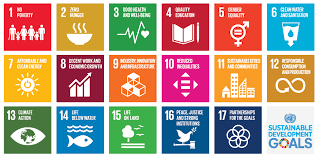The Sustainable Development Goals (SDG) Programme: A Global Initiative for a Better Future
The Sustainable Development Goals (SDGs) programme, adopted by all United Nations Member States in 2015, is a universal call to action to end poverty, protect the planet and ensure that all people enjoy peace and prosperity by 2030.
Comprising 17 interconnected goals, the SDGs address various global challenges, including poverty, inequality, climate change, environmental degradation, peace, and justice. Each goal has specific targets to be achieved over the next decade.
The 17 Sustainable Development Goals:
- No Poverty
- Zero Hunger
- Good Health and Well-being
- Quality Education
- Gender Equality
- Clean Water and Sanitation
- Affordable and Clean Energy
- Decent Work and Economic Growth
- Industry, Innovation and Infrastructure
- Reduced Inequality
- Sustainable Cities and Communities
- Responsible Consumption and Production
- Climate Action
- Life Below Water
- Life on Land
- Peace and Justice Strong Institutions
- Partnerships to achieve the Goal
The SDGs are not just a set of goals but a roadmap for governments, businesses, civil society organisations, and individuals to work together towards a sustainable future. Achieving these goals requires collective action at both local and global levels.
By promoting economic growth that is inclusive, sustainable, and equitable; protecting the environment; advancing social development; and ensuring peace and security for all, the SDGs aim to create a better world for present and future generations.
Understanding the SDG Programme: Key Questions and Answers
- What is the SDG program?
- What is SDG and its purpose?
- What are the 17 SDGs?
- What are the 3 main focuses of SDG?
- What is SDG scheme?
- What is the SDG Cities Programme?
What is the SDG program?
The Sustainable Development Goals (SDG) programme, also known as the Global Goals, is a comprehensive initiative established by the United Nations to address pressing global challenges and promote sustainable development worldwide. Consisting of 17 interconnected goals, the SDGs aim to tackle issues such as poverty, inequality, climate change, and environmental degradation by setting specific targets to be achieved by 2030. This ambitious programme serves as a universal call to action for governments, businesses, civil society organisations, and individuals to work collaboratively towards building a more prosperous, equitable, and environmentally sustainable future for all.
What is SDG and its purpose?
The Sustainable Development Goals (SDGs) are a set of 17 global goals established by the United Nations in 2015 as part of a universal call to action to end poverty, protect the planet, and ensure prosperity for all by 2030. The purpose of the SDGs is to address a range of interconnected challenges facing the world today, including poverty, inequality, climate change, environmental degradation, peace, and justice. Each goal has specific targets aimed at promoting sustainable development and fostering collaboration among governments, businesses, civil society organisations, and individuals to create a more equitable and sustainable future for everyone.
What are the 17 SDGs?
The 17 Sustainable Development Goals (SDGs) are a set of global objectives established by the United Nations to address key challenges facing humanity by 2030. These goals encompass a wide range of areas including poverty eradication, health, education, gender equality, clean energy, sustainable cities, climate action, and more. Each SDG has specific targets and indicators aimed at guiding countries and stakeholders towards achieving a more equitable, sustainable, and prosperous future for all. By working towards these goals collectively, we can make significant strides in creating a better world for current and future generations.
What are the 3 main focuses of SDG?
The Sustainable Development Goals (SDGs) encompass a broad range of global challenges and aspirations, with three main focuses at their core. Firstly, the SDGs aim to eradicate poverty in all its forms, promoting economic growth that is inclusive and sustainable. Secondly, they seek to address social inequalities and promote social development by ensuring access to quality education, healthcare, and basic services for all. Lastly, the SDGs emphasise the importance of environmental sustainability and climate action to protect our planet for future generations. By focusing on these three key areas – poverty eradication, social development, and environmental protection – the SDG programme aims to create a more equitable, prosperous, and sustainable world for all.
What is SDG scheme?
The SDG scheme, also known as the Sustainable Development Goals scheme, is a global initiative established by the United Nations to address pressing global challenges and promote sustainable development. Comprising 17 interconnected goals, the SDG scheme aims to end poverty, protect the planet, and ensure prosperity for all by 2030. Each goal within the scheme targets specific areas such as poverty alleviation, gender equality, climate action, and quality education. By implementing targeted strategies and fostering collaboration among governments, organisations, and individuals worldwide, the SDG scheme seeks to create a more equitable and sustainable future for all.
What is the SDG Cities Programme?
The SDG Cities Programme is a strategic initiative that focuses on localising the Sustainable Development Goals (SDGs) within urban areas. This programme aims to empower cities to implement sustainable and inclusive practices that align with the global SDGs framework. By engaging with city governments, stakeholders, and communities, the SDG Cities Programme seeks to address key challenges such as poverty, inequality, climate change, and urban development in a holistic and integrated manner. Through this initiative, cities are encouraged to develop innovative solutions and policies that promote sustainable urban growth while contributing to the overall achievement of the SDGs on a local level.
